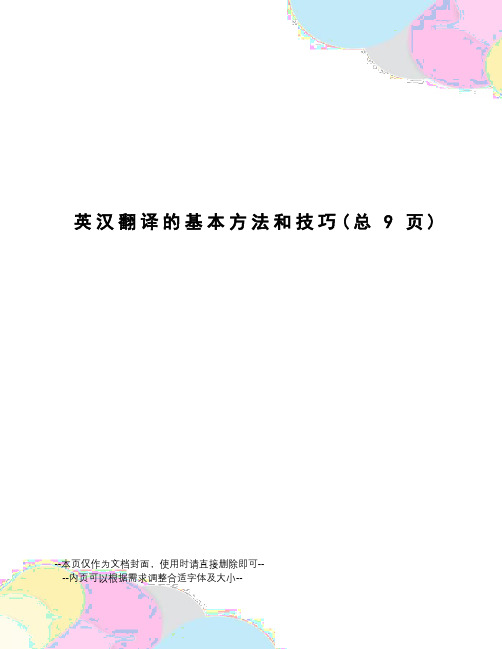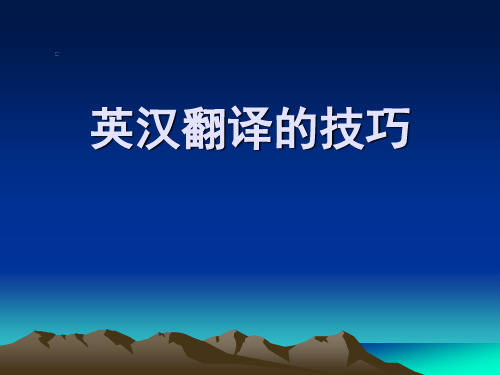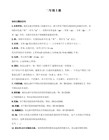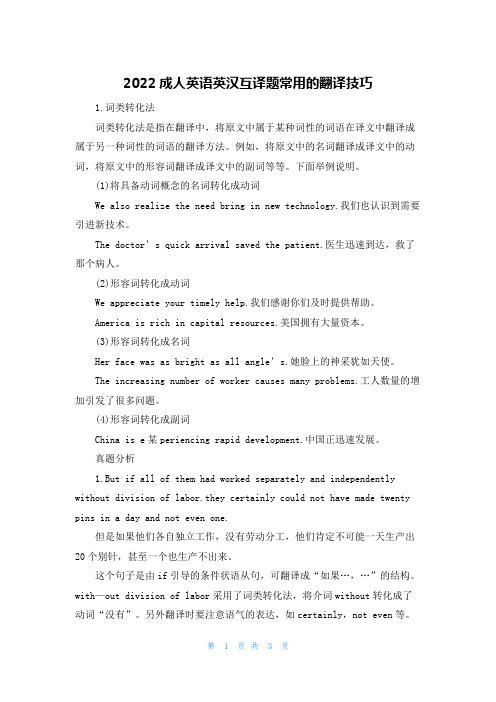【翻译技巧】英汉翻译中的选词技巧
英汉翻译的基本方法和技巧

英汉翻译的基本方法和技巧(总9页)--本页仅作为文档封面,使用时请直接删除即可----内页可以根据需求调整合适字体及大小--英汉翻译的基本方法和技巧翻译是信息交流过程中极其复杂的社会心理现象。
语言知识是翻译的基础。
此外,翻译还涉及到推理、判断、分析和综合等复杂的心理认识过程。
翻译的方法和技巧是翻译工作者在长期的实践中根据两种语言的特点总结归纳出来的一般规律。
这些规律可以指导我们的翻译实践,使我们能更自觉、更灵活地处理翻译过程中所遇到的各种语言现象。
下面就英译汉中的一些方法和技巧结合翻译实例作一概述。
?1.词义的选择一词多义和一词多类是英汉两种语言都有的一种语言现象。
因此,在平日的翻译练习和测试中,我们在弄清原文句子结构后,务必注意选择和确定句中关键词的词类和词义,以保证译文的质量。
通常可从以下三个方面来考虑词义选择:1)根据词在句中的词类来选择词义例如:Censorship is for the good of society as a whole. Like the law, it contributes to the common good.[译文]:审查是为了整个社会的利益。
它像法律一样维护公众利益。
[注释]:本句中like作介词,意为"像……一样"。
但like作动词用,则意为"喜欢;想要"。
例如:He likes films with happy endings. (他喜欢结局好的电影。
)又如:Would you like to leave a message (你要不要留个话儿)此外,like还可以作形容词用,意为"相同的",如:Like charges repel; unlike charges attract.(电荷同性相斥,异性相吸。
)2)根据上下文和词在句中的搭配关系选择词义例1According to the new school of scientists, technology is an overlooked force in expanding the horizons of scientific knowledge.[译文]:新学派的科学家们认为,技术在扩大科学知识范围过程中是一种被忽视的力量。
英汉互译词义技巧指导

9.Present at the meeting were the heads of government of the four countries.
10.Go and ask the head of our department. 11. Heads or tails? 12.Where is the head?
7.我已经好久没有看见他了.I haven‘t seen him for a long time.
8.我好几个星期都不在家.I stayed away for several weeks.
develop:
develop a new business 发展一家新的商行 develop packaged software develop a new type of car 开发软件包 研制新型汽车 开拓新的技术领域
形容词选词实例: • He once again imparted to us his great knowledge, experience and wisdom. • 我们又一次领受了他那广博的知识、丰富的 经验和无穷的智慧。
动词选词实例: • In every Chinese city, we got into the streets, shops, parks, theatres and restaurants. • 在中国我们每到一个城市,就逛大街、逛商 店、逛公园、上剧场、下饭馆。
第4章
英汉翻译技巧
4.1 词义的确定 一、理解中的选义 二、表达中的选词
Born in 1879 in Ulm, Germany, Albert Einstein was two years old when his parents moved to Munich, where his father opened a business in electrical supplies.
英译汉翻译的技巧例句

三、语态的转换 1. 英语中的被动语态可以译为主动语态。如: Much has been said about the necessity of introducing foreign funds into Chinese enterprises. 有关中国企业引进外资的必要性已经谈的很 多了。
2. 英文中的被动语态还可以译成汉语中的 “由、受、遭到、靠、让、要、得到、得 以、可以、加以”等结构。如: If the stability can be maintained ,one of the worst features of the cycle will have been removed. 如果这种稳定状态得以保持下去,商业周期 最坏的一个特征将被消除。
3.英语名词→汉语形容词
英语原文中有形容词加后缀构成的名词,翻 译时可转化为汉语的形容词。 如: Scientists are no strangers to politics. 科学家对政治并不陌生。 We found difficulty in solving the complicated problem 我们发现解决这个复杂的问题是很困难的。
4.英语介词副词→汉语动词
He came to my home for help. 他来到我家请求帮助。 I love having Friday off. 我喜欢周五休息。 I am for the former. I am against the latter.
5.英语副词→汉语名词
It was officially announced that Paris is invited to the meeting. 官方宣布, 巴黎应邀出席会议。
The man I saw at the party looked and talked like an American. 我在晚会上看到的那个人,外表和谈吐像美 国人。 The electronic computer is chiefly characterized by its accurate and rapid computation. 计算机的主要特点是计算准确迅速。
汉译英翻译技巧分析解析【范本模板】

汉译英翻译技巧一、分清主从(Subordination)汉语句中各分句关系比较松散,所以在动笔前应认真分析句子要旨所在.句中重点往往在后.英译时,要突出重点或主句,其他部分可分别用介词短语,非谓语动词形式或各种从句表示。
1、没有农业,人们就不能生存,社会生产就不能继续下去。
Without agriculture, people cannot exist,neither can social productionproceed。
2、他们一听到“反霸”就火冒三丈,这充分暴露了他们那霸权主义的蛮横嘴脸。
The fact that they fly into a rage at a mere mention of the expression“anti—hegemony”is enough to reveal their true colours as a domineering hegemonists。
3、有人以为社会主义就了不起,一点缺点也没有,哪有这个事?Some believe that socialism is just perfect,without a single flaw. How canthat be true?4、但是,象我们常说的那样,道路总是曲折的,前途总是光明的。
But as we have often said,while the road ahead is tortuous, the future isbright.二、选词用字(Diction)在汉译英时应特别注意选找与原文中在意义上和风味上尽可能都类似的词语.1、每个民族都有它的长处,不然它为什么能存在?为什么能发展?Every nation has its own strong points。
If not, how can it survive?How can it progress?2、树雄心,立壮志,向科学技术现代化进军.Foster lofty ideals,set high goals and march forward for the revolutionof modernization of science and technology.3、我国的社会主义建设,需要一个和平的国际环境,需要一个国内安定团结,天下大治的局面。
英译汉常用的方法和技巧

这些事件引起了我们的重视.
八. 分句法, 合句法(运用较多,且非常重要) 1. 分句法: 把原文中的一个单词译成句子, 使原文中的一个句子分
译成两个或两个以上的句子.
The Chinese seemed justifiably proud of their economic achievements. 中国人似乎为他们取得的经济成就而感到自豪, 这是合乎情理的. Energy can neither be created nor destroyed, a universally accepted
与之相比. 2) 溶合法(把原文中的主语和定语从句溶合在一起, 译成一个独
立的句子, there be结构汉译时, 以及在科技英语中常用)
There is a man downstairs who wants to see you. 楼下有人要见你.
There are some metals which posses the great power of conduct electricity.
他想给他们增加些援助, 增添些武器, 增派些人员.
2. 为了生动(使用四字词组, 重叠, 四字对偶)
But there had been too much publicity about my case.
但我的事情现在已搞得满城风雨, 人人皆知了.
Target priorities were established there.
us in its grip, it is hard for us to recognize what ails (折磨) us. (Book 4, reading course, P67, L.18-20) 它不是突然发生的, 毫无戏剧性可言, 因此它就有了一个极大的优 势, 它悄悄地一点一点地吞噬我们的心灵,一旦被它完全控制, 我们 甚至很难看出是什么在折磨我们.
英汉翻译常用技巧

英汉翻译常用技巧一、在翻译过程中如何进行词义的选择?英汉两种语言都有一词多类、一词多义的现象。
一词多类就是指一个词往往属于几个词类,具有几个不同的意思。
一词多义是说同一词在同一词类中,有几个不同的词义。
词义的选择可以从以下三方面着手。
(一)根据词类1、The earth goes round (介词)the sun. 地球环绕太阳运行。
2、The food supply will not increase nearly enough to match this,whichmeans that we are heading into a crisis in the matter of producing andmarketing (动词)food.食品供应无法跟上人口增长的步伐,这意味着在粮食的生产和销售方面我们将陷入危机。
分析:market可以既作名词又作动词。
在作名词时,可译为“市场”、“行业”、“需求”等等。
例句中的market 是作动词用的,可以译为“买,卖”或“销售”,根据句中描述的情形,用“销售”更妥当。
(二)根据上下文和搭配关系3、Power can be transmitted over a long distance.电力可以被输送到很远的地方。
4、A car needs a lot of power to go fast.汽车高速行驶需要很大的动力。
5、Explosive technological development after1990gave the medical professionenormous power to fight disease and sickness.1990年以来,随着技术的迅速发展,医学界大大提高了战胜疾病的能力。
(三)根据可数或不可数6、After their interview,he compares not their experience(不可数),but their statistics…面试以后,他并不比较他们的经验,而是比较他们的统计数字。
英译汉的基本技巧和思路法则(1)

• 基本技巧: • 一、词六法 • 1.选词表达法(翻译选词表达时注意原文上 下文,注意褒贬义,注意比喻意义) • 2.词性转译法(把原文中名、动、形、副等 实义词在译文中转换词性) • 3.增益法(在译文中增加名、动、形、副等 实义词) • 4.省略法(在译文中省掉原文中代、连、冠、 介、系动词及其他结构连接词) • 5.重复法(原文中动、名、代词或词组等重 复译出) • 6.正一反、反一正表达法(原文中的意思译 文中反过来讲,原文中反的意思译文中正过来讲)
• 二、句四法 • 1.分句/合句法(不拘泥原文的句子设 置,可分句,可合句,但英译汉分句多) • 2.被动一主动法(英语被动句中某些可 以译成汉语的主动式) • 3.从句处理法(复杂句要不要分句,若 分句,先译什么后译什么,若不分句,句 子成分如何排序) • 4.长句拆译法(很长的句子可拆译,分 成若干句,拆译时注意排列顺序)
英译汉的思路法则
• 一、英译汉以句子为单位构思。 • 二、读完一个英语句子,作语法分析,找出主句 的主、谓、宾,再看其他成分怎么构筑到这些主 要成分上,并判断翻译要不要分句。若分句,先 译哪部分,后译哪部分。 • 三、若不分句,则考虑句子内各句子成分怎么排 序。绝大多数情况下,英句内各成分在译成汉语 时位置都需要重新调整。 • 四、译完一个段落,读它四、五遍,可有可无的 词一概舍去,毫不足惜。可合句的合句。语言逻 辑不连贯的要调整到通顺连贯。
• 三、几种特殊情况 • l. 由于思维逻辑和表达逻辑有所差异,有时翻 译时应意译,不宜直译。 • 2.习语的翻译。英语的成语若汉语有类似意 义的成语可对应过来,如无对应成语,但 • 按字面上意思直译可接受,则直译,不可接受, 则意译。 • 3.英语拟声词是模拟人、动物、物体响声的 词,译成汉语可以译音或者加“叫” • “声”“响”等词。 • 4.专有名词的翻译。人名、地名原则上名从 音译。专有名词可以音译、意译、半音半意、音 译加说明词等4种方法。一切要因“文”制宜。
翻译技巧: 词义的选择与表达+词类转换等

【例3】技术引进合同应当订明下列事项:(一)……(四) 引进技术的保密义务,改进技术的归属和分享。 译文l: (4) provisions on the obligation to keep confidential the imported technology, and ownership of the right to copy any improvements made to the technology. 译文2: (4) provisions on the confidentiality obligation as regards the imported technology, and ownership of the right to copy any improvements made to the technology. 【例4】这次十三届八中全会开得好。 译文1: The recent Eighth Plenary Session of the Thirteenth Central Committee was a successful meeting. 译文2: The recent Eighth Plenary Session of the 13th CPC Central Committee was a success.
• 二、注意词的搭配 【例4】Capitalism cannot cure itself of its destructive internal contradiction. 直译:资本主义医治不了它本身的毁灭性的内在矛盾。 【例5】He halted in the district where by night are found the lightest street, hearts, vows and librettos. • 译文1:他到了一个市区才停步,在那里晚上有最轻 的街道,最轻的心情,最轻的盟誓和最轻的歌曲。 • 译文2:他到了一个市区才停步,在那里晚上有最明 亮的街道,最愉快的心情,最轻易出口的盟誓和最轻松 的歌曲。 【例6】Thackeray的《名利场》中有一句话:…who is a good Christian,a good parent,child,wife or husband... 杨必译为:“……真的是虔诚的教徒,慈爱的父母,孝顺 的儿女,贤良的妻子,尽职的丈夫……”
汉译英翻译常用技巧

汉译英翻译常用技巧汉译英是语言转换的过程,需要结合语言特点和句子结构来进行翻译。
下面是汉译英翻译常用技巧的一些要点:1.注意词语的使用在翻译过程中,应注意选择适当的词语,避免使用生硬的直译。
可以根据句子的具体语境来选择合适的词语,充分考虑词义、语体、文化背景等因素。
2.理解词语的多义性汉语中的词语通常有多个义项,需要根据上下文确定正确的翻译。
在翻译过程中,要注意词语的多义性,避免产生歧义。
3.注意语法结构中英语法结构有很大差异,所以在翻译过程中要注意语法结构的转换。
例如,英语中主谓宾的语序与汉语有所不同,需要注意将句子结构调整为符合英语语法的形式。
4.注意动词的时态英语中的动词时态较为复杂,需要根据上下文确定正确的时态。
在翻译过程中,要注意将动词的时态正确地转换为英语的对应形式。
5.注意做动词的“的”和“得”在汉语中,“的”和“得”在做动词时的用法相似,但在英语中它们有不同的翻译。
一般情况下,“的”翻译为“的”或“的”;“得”翻译为“to”或“must”。
6.使用适当的连词在汉译英翻译中,使用适当的连词能够使句子更加流畅。
常用的连词有“but”、“and”、“or”等。
根据句子的逻辑关系和语境,选择合适的连词来进行翻译。
7.注意上下文的衔接在翻译过程中,要注意将上下文的信息进行衔接,以确保翻译准确传达原文的意思。
在处理复杂句子时,要注意将上下文中的重要信息和语法结构准确地表达出来。
8.考虑文化差异汉英翻译中需要考虑不同文化背景对表达方式的影响。
在翻译过程中,要注意在尊重原文的同时,将信息准确传达给目标读者。
9.使用合适的术语和行业词汇根据具体领域的需求,要选择合适的术语和行业词汇。
在翻译过程中,要了解所涉及领域的专业术语,确保翻译的准确性和专业性。
10.多加练习翻译是一项技能,需要通过不断的练习来提高。
多进行汉译英的练习,积累翻译经验,提高翻译的准确性和流利度。
总之,汉译英的翻译技巧是一个不断学习和掌握的过程,通过不断的练习和积累,可以提高翻译的准确性和质量。
翻译选词技巧

31108040
词义选择
注意词义的褒贬:由于人们对事物态度 不同,就会使用含有不同感情色彩的词, 如肯定、否定、尊敬、诅咒、庄严、幽 默、鄙视等,在翻译时,要选用相应的 词语将它表达出来
1、那个小女孩非常天真。
2、那个女孩真天真,居然相信那个男人说 的话。
1、That little girl is very innocent.
本句中的“天真”,没有恶意,是褒义词,故译 为innocent
2、How naive that girl is to be taken by what that man said. 本句中的天真,显然带有贬义色彩,故译为 naive.
1、这次成功使他名声大振。
2、这件事关系到他的名声。 3、他在生前名声极坏。 1、This success greatly enhanced his fame. 本句中的’名声”指“好的名声”,故译为为fame 2、This matter concerns his reputation. 本句中的名声,既非指好名声,也不指坏名声。所 以用reputation这个中性词来翻译。
1、Because once you know how you are and how other people see you, you can then get into the driver’s seat.
译:因为你一旦了解了自己的状况和别人对 你的看法,你就能掌握主动权。 Driver’s seat 本意是“驾驶座”,在此抽 象引申为“主动权”,因为坐在驾驶座上的 人往往控制着行进的方向和目标。
3、It is unfair that historians always attribute the fall of kingdoms to Helen of Troy.
翻译技巧一-词义选择

That’s a tall story about the town’s high street.原译:这就是有关镇上高处街道的大故事。 改译: 有关这城主街的说法实在令人难以置信。 high street: the main street of a town or a city; tall: a. hard to believe, exaggerated
[1][2][3][4][5]
(动词)
(前置词)
(名词)
2. 根据上下文联系以及词在句子中的搭配关系来选择和确定词义 英语中同一个词,同一词类,在不同场合往往也有不同的含义,必须根据上下文的联系以及词的搭配关系或句型来判断和确定某个词在特定场合下所应具有的词义。例如“Last”这一形容词:1) He is the last man to come. 他是最后来的。(Being, coming, or placed after all others; final) 2) He is the last man to do it. 他绝对不会干那件事。 (Least likely or expected)3) He is the last person for such a job. 他最不配干这个工作。(The least desirable or suitable)
词义引申的手段
词义的转化词义的具体化词义的抽象化
词义的转化
翻译时,如果完全生搬硬套字典所给的字面意思,“对号入座”,会使译文生硬晦涩,含糊不清,甚至令人不知所云。因此,应根据上下文和原词的字面意思,作适当的转化。
Case 1
The factors which are likely to influence investment spending do not stop here.译:可能影响投资开支的因素并不止这些。析:do not stop here 由“不停留在这里”转译为“并不止这些”。
英译汉翻译技巧

英译汉翻译技巧英译汉是指将英文翻译为中文的过程,这是一项非常有挑战性的任务。
以下是一些英译汉的技巧,可以帮助提高翻译的准确性和流畅度。
1. 理解上下文:在进行翻译之前,首先要仔细阅读原文,理解其中的上下文和语境。
这样可以帮助你更好地理解作者的意图和表达方式,从而更准确地翻译出来。
2. 注意词汇选择:英文和中文之间存在很多词汇差异,因此在翻译时要注意选择正确的词汇。
可以借助词典、在线翻译工具或者查阅相关语料库来寻找合适的词汇,确保翻译的准确性和恰当性。
3. 保持语法结构一致:英文和中文的语法结构有所不同,翻译时要注意保持语法结构的一致性。
特别是在进行长句或复杂句子的翻译时,要确保句子的结构和语法正确,避免造成歧义或困惑。
4. 注重表达方式:中文和英文的表达方式有很大的差异,翻译时要注重表达方式的转换。
可以借助中文的习惯表达方式和惯用语,使翻译更加流畅自然。
5. 注意文化差异:英文和中文所处的文化环境有所不同,翻译时要注意文化差异。
有些词汇、习惯用语或者俚语在不同的文化背景下可能会有不同的含义,需要适当加以调整或解释,以确保翻译的准确性和适用性。
6. 反复校对和修改:在完成翻译之后,要对翻译的内容进行反复校对和修改。
可以逐句对照原文进行校对,检查是否有语法错误、词汇不准确或表达不清的问题。
通过多次修改和校对,可以逐渐提高翻译的质量和准确性。
7. 增强背景知识:翻译工作需要有广泛的背景知识,因此提高背景知识是提高翻译水平的一项重要任务。
可以通过读书、学习相关专业知识、参加翻译培训等方式来增强自己的背景知识,从而更好地理解和翻译英文内容。
总之,英译汉是一项需要技巧和经验的任务,通过不断学习和实践,可以提高翻译的准确性和流畅度。
中级笔译:英译汉技巧

The lack of any special excretory system is explained in a similar way .
植物没有专门的排泄系统,可用同样的方式加以说明。(名词转译)
As he ran out ,he forgot to have his shoes on .他跑出去时,忘记了穿鞋子。
He wandered along the street ,thinking and thinking brooding and brooding.
他在街头游来荡去,想了又想,盘算了又盘算。
3、为了生动
While stars and nebulae look like specks or small patches of light . they are really enormous bodies.
我曾碰到过,不是氧气设备了故障,就是引擎出故障,或两者都出故障(重复名词)
Under ordinary conditions of pressure ,water becomes ice at C and steam at 100C.
结了电子计算机、人造卫星和火箭这三方面的新成就。(增加概括词)
2、根据句法上的需要增补一此词汇。
Reading makes a full man ;conference a ready man ;writing an exact man.
读书使人充实,讨论使人机智,写作使人准确.(增补原文句子中所省略的动词)
I had known two great social systems .那是以前,他就经历过两大社会制度。(增加表达时态的词)
翻译中的选词

2 第 章 翻译中的选词
第一模块:翻译技巧
长期以来,中国学生在学习英语的过程中总喜欢通过词典中的汉语意思 记忆单词,久而久之,就形成了一种“怪圈”:翻译的时候,往往将英语单 词和汉语词语一一对应起来,结果造成翻译中用词不当的现象。实际上,几 乎每一种语言都有一词多义的现象。具体地说,英语单词和汉语词语并非 一一对应的关系;相反,一个英语单词往往对应几个汉语意思,因此翻译时 要根据词所在的语境确定其在上下文中的含义。而且,词在上下文中的意义 广狭、词的感情色彩、词的语体色彩等都应根据其所在的语境作出选择,然 后在目的语中选择恰当的对应词(equivalent)。
例5中的go-ahead本身有“前进”的意思,这里显然不能直译,所以引申 为“继续”;例6中seesaw有“拉锯”和“玩跷跷板”之意,但这里显然也不 能直译,而应将其引申意思“颠簸”译出;例7中的elbow指“勇气”,不能直 接译作“肘部”。
二、根据语境中词义的广狭选词
词义有广狭之分。同一个英文词有时在不同的语境中其广狭意义不同。 比如英语中的cat有时译成“猫”(狭义),有时译成“猫科动物”(广义), cousin有时要译成“表亲”这一广义的概念,有时要译成“表哥”或“表姐” 等狭义的概念。再看下面的例子:
clear understanding 透彻的理解/理解透彻
汉译英之根据词的搭配习惯选词

The APEC membership has influenced China in several respects.
另外,选词时还要注意词的广义、狭义、褒贬、 强弱和政治分寸
1.农业是国民经济的基础。(广义)
Agriculture is the foundation of our national economy.
➢ 让我在从头讲起。 Let me tell the story from the very
beginning. ➢ 他把铅笔头扔了。 He has thrown away the pencil stub. ➢ 他是我们组的头儿。 He is the head/chief of our group. ➢ 他们是一头儿的。 They are on the same side.
开
➢ 开车 Drive a car ➢ 开船 Set sail ➢ 开机器 Start a machine
谢谢观赏
踏踏实实做好每一件事,不抱怨、不放弃,为自 己的梦想尽每一份力。
Do everything in a down-to-earth way, do not complain, do not give up, and do everything for your dream.
语时就要选用各种不同的动词才符合英语的习 惯表达法;
2.青山绿水green hills and blue streams 青云直上rise in the world 浓咖啡strong coffee 浓墨淡写 paint with thick ink and a light touch 同样,同是一个“青”和“浓”字,与不同的词
2022成人英语英汉互译题常用的翻译技巧

2022成人英语英汉互译题常用的翻译技巧1.词类转化法词类转化法是指在翻译中,将原文中属于某种词性的词语在译文中翻译成属于另一种词性的词语的翻译方法。
例如,将原文中的名词翻译成译文中的动词,将原文中的形容词翻译成译文中的副词等等。
下面举例说明。
(1)将具备动词概念的名词转化成动词We also realize the need bring in new technology.我们也认识到需要引进新技术。
The doctor’s quick arrival saved the patient.医生迅速到达,救了那个病人。
(2)形容词转化成动词We appreciate your timely help.我们感谢你们及时提供帮助。
America is rich in capital resources.美国拥有大量资本。
(3)形容词转化成名词Her face was as bright as all angle’s.她脸上的神采犹如天使。
The increasing number of worker causes many problems.工人数量的增加引发了很多问题。
(4)形容词转化成副词China is e某periencing rapid development.中国正迅速发展。
真题分析1.But if all of them had worked separately and independently without division of labor.they certainly could not have made twenty pins in a day and not even one.但是如果他们各自独立工作,没有劳动分工,他们肯定不可能一天生产出20个别针,甚至一个也生产不出来。
这个句子是由if引导的条件状语从句,可翻译成“如果…,…”的结构。
with—out division of labor采用了词类转化法,将介词without转化成了动词“没有”。
英译汉常用的方法和技巧

英译汉常用的方法和技巧英译汉常用的方法和技巧引导语:英译汉常用的方法和技巧,由应届毕业生培训网整理而成,谢谢您的阅读,祝您阅读愉快。
一、词义的选择、引申和褒贬1.一词多义(Polysemy)regularregular reading / regular job / regular flight / regular visitor / regular speed / regular army / gasolinedelicatedelicate skin / porcelain / upbringing / living / health / stomach / vase / diplomatic question / difference / surgical operation / ear for music / sense of smell / touch / food2.注意有线词的词义He once again imparted to us his great knowledge, experience and wisdom.He now saw plainly the meaning of all. In the beginning, he had got a job the first day; but now he was second-hand, a damaged article, and they did not want him. They had got the best out of him, and now they had thrown him away. The situation had now become desperate. Then came another incident.3.词义的引申(Extension or Generalization)1) Extend the word meaning to cover an abstraction conceptHis novel is a mirror of the times.The OED is the final court of appeal in all matters concerning English words.Sam knows he can depend on his family, rain or shine.2) Extend the word meaning to cover a specific conceptIn two years, he was a national phenomenon.Public opinion is demanding more and more that something be done about noise.Mary’s father, by his first marriage, had a daughter, Jane, Mary’s half-sister.4.词义的褒贬(Commendatory and Derogatory)The reckless driver died in the traffic accident.Poor Joe’s panic lasted for two or three days; during which he did not visit the house.It was time to hold a court and the subject for discussion was the future of that prisoner.John was an aggressive salesman who did his job quite well.The invaders met a stubborn resistance from the local people.She was vexed by the persistent ringing of the phone.5.ExercisesI have no opinion of that sort of man.She put five dollars into my hand. “You have been a great man today.”I’m afraid you’re being too particular about your food.I was the youngest son, and the youngest but two.The picture flattered her.The country not agreeing with her, she returned to England.二、词类转译法(一)转译成动词(1)名词转译动词(Convert nouns into verbs)My admiration for him grew more.He said he did not know whether Tom was ready for a showdown.To some extent it gets into the question of the chicken or the egg.The Nobel prizes in physics and chemistry were rewarded to Americans, giving the U.S. a clean sweep of all the 1976 Nobel prizes in the sciences.Television is the transmission and reception of image of moving objects by radio waves.In the absence of friction, the vehicle could not even be started.Vietnamese War is a drain on American resources.I am no drinker, nor smoker.The application of electronic computers makes a tremendous rise in labor productivity.(2)介词转译成动词(Convert prepositions into verbs)There are many substances through which electric currents will not flow at all.We are fortunate in our opponent.Captain Ford was between the sheets by 9 last night.The most he is after at this time is a chance to get more money.I tried to talk him out of the idea, but he was unpleasant.Millions of the people in the mountainous areas are finally off poverty.“Coming!” Away she skimmed over the lawn, up the path, up the steps, across the veranda, and into the porch.(3)形容词转译成动词(Convert adjectives into verbs)He said the meeting was informative.They were news-hungry.It was a very informative meeting.(4)副词转译成动词(Convert adverbs into verbs)The experiment in chemistry was ten minutes behind.It has snowed over.Why should we let in foreign goods when Americans walk the streets because they can’t sell their own goods?(二)转译成名词(1)动词转译成名词(Convert verbs into nouns)She knows what’s what.They thought differently.TV differs from radio in that it sends and receives pictures.The computer is chiefly characterized by its accurate and rapid computations.He roared, which threatened his enemies away.The man I saw at the party looked and talked like an American.(2)形容词转译成名词The new treaty would be good for ten years.The language of the poem is colloquial, yet it’s deep in its understanding of human emotions.Then the monkeys were trained according to different plans so as to make them highly individualized.Everyday experience shows us that heavy objects are more stable than light ones.(三)转译成形容词名词转译成形容词Their physical experiment was a success.The nuclear power system designed in China is of great precision.Said a New York bullion trader, “The market’s gone banana.”He found on this issue, as on Taiwan, an identity of approach.In Europe, his name was well known, if not a household word.(四)其他词类转译副词转译成名词The air-conditioning unit is shown schematically on Page 2.Oxygen is one of the important elements in the physical world, it is very active chemically.The image must be dimensionally correct.三、被动语态的`译法(一)大量的英语被动句要化成汉语的主动句1. He said the pact had now been reduced to less than a shadow.2. She had no knowledge of this and had not been consulted on these reported plans.3. What has just been written runs the risk of oversimplification.4. Many voices have been raised demanding the setting up of an Arab common market.(二)以by为着眼点,进行多种译文1. But real influence is not built up by striking attitude or by throwing insults.2. Its sincerity is illustrated not only by its proposal but also by its deeds.3. What I like best are the stern cliffs, with ranges of mountains soaring behind them, full of possibilities, peaks to be scaled only by the most daring.4. Many expect that he will be outed by one of his rivals.5. He said he was assured by the State Department that the U.S. is willing to normalize relations with his country.(三)“it + be + p.p. + that clause”的句型,常以下列形式表达1. It should be noted that he and she were academically more than just friends.2. It should be understood that to err is human.(四)汉译中需用被动式时,也最好多找一些字眼来取代“被”字1. The visitor was flattered and impressed.2. Everybody was fed up with her gossip.3. He was set upon by two naked men.4. If the expenditure is really necessary, the money can be found somehow.5. He was released immediately after Batista fled Cuba.四、增词法(一)名词、动名词前增补动词1. We often go to the school-run factory for labor.2. Testing is a complicated problem and long experience is required for its mastery.(二)英语抽象名词的翻译1. He was still reluctant to talk substance.2. Many changes take place during the transformation.3. Her indifference kept all the visitors away from the exhibition hall.4. From the evaporation of water people know that liquid can turn into gases under certain conditions.(三)将具体形象的词译成该形象所具有的属性和特征,这是一种引申,需增词1. It was a Godsend to him.2. If you dare to play the fox with me, I’ll shoot you at once.(四)增添“概括”性的词1. He had slept there before, in July and again in October.2. Their host carved, poured, served, cut bread, talked, laughed, proposed health.3. The government is doing its best to ease the tension in that area.4. Proteins are composed of carbon, hydrogen, oxygen andnitrogen.5. This report summed up the achievements in technology and education.(五)英文中为避免重复而省略之词,汉译时需补上,作必要的重复1. I hope that the meeting will not be too long, for it will only waste time.(六)汉译文根据原文意思增加一些必要的解释性文字1. And he launched into a speech, eloquently advocating his university of the future.2. Those were the words that were to make the world blos som for, “like Aaron’s rod, with flowers”.(七)增补量词1. Repeat the experiment using a wooden ruler, a piece of glass, a metal spoon, a coin, a piece of paper, a pin, a plastic comb,a key, a pencil, a tin lid and a rubber eraser.2. On April 24th 1970, China successfully launched its first man-made earth satellite.(八)增补表示复数含义的词1. But that the old workers helped us, we should have failed.2. The moving parts of a machine are often oiled so that friction may be greatly reduced.【英译汉常用的方法和技巧】。
英汉互译第四章翻译技巧

3 词义的选择
英汉两种语言都有一词多类、一词多义的现象。一词 多类就是指一个词往往属于几个词类,具有几个不同的意义。 一词多义就是说同一个词在同一个词类中,又往往有几个不 同的词义。在英汉翻译过程中,我们在弄清原句结构后就要 善于选择和确定原句中关键词的词义。选择和确定词义通常 从以下几个方面着手:
as drunk as a fiddler 酩酊大醉 (在古英格兰,民间小提琴手在公共场合为舞 蹈伴奏,人们往往以酒酬谢,因此往往会喝得 大醉.后人用此成语时,常常重意不重形与典, 因此,不必直译为 "像小提琴手一样酩酊大醉 ",采用释义法即可.)
bring down the house 全场喝彩 (不能直译为 "把房子都弄倒了")
第四章 翻译技巧1
• • • • • 加注 释义 词义的选择 词义的引申 词义的褒贬
1. 加注(annotation)
由于英汉文化存在许多差异,因此译入语 中某些文化词语在译出语中根本就没有对 等词,形成了词义上的空缺。在这种情况 下,英汉互译时常常要采用加注法来弥补 空缺。加注通常可以用来补充诸如背景材 料、词语起源等相关信息,便于读者理解。 加注法可分为音译加注和直译加注两种。
下海 jumping into the sea of business (若直译为 jumping into the sea容易引起误解) 拜堂 perform the marriage ceremony
(1) It's not easy to become a member of that club-they want people who have plenty of money to spend, not just every Tom, Dick, and Harry. 要参加那个俱乐部并非易事──他们只吸收手头阔 绰的人,而不是普通百姓。 (Tom, Dick, Harry都是英美常见的人名,这里泛指 任何人,相当于汉语中的"张三、李四、王五"。 所以,这里不宜直译为"汤姆、迪克、哈里"。)
英译汉常用的方法和技巧

LOGO
(二)前置词/介词转译成动词
(三)形容词转译成动词
(四)副词转译成动词
1) Spring is in at last. 春天终于来到了。
LOGO
2) The Democratic Party was then in. 当时是民主党执政。
LOGO
词类转译法(一)
一 转译成动词 (一)名词转译成动词 1) She has a firm conviction that she will overcome all the difficulties. 她坚信她会克服所有的困难。
1) My suggestion is that he should quit smoking at once. 我建议他立刻戒烟。
LOGO
2) He has the assurance to ask me for money. 他竟然厚着脸皮向我要钱。
3) Jim was an aggressive engineer who did his job quite well. 吉姆是个有进取心的工程师,他工作干得很出色。
LOGO
3) That company was short of hands. 那家公司缺少人手。
4) We have the situation well in hand. 我们能把握好局势。
5)They give the film star a big hand. 他们鼓掌欢迎这位电影明显。
LOGO
4) … that government of the people, by the people, for the people shall not perish from the earth. 这个民有,民治,民享的政府,将不会从地球上消失。
- 1、下载文档前请自行甄别文档内容的完整性,平台不提供额外的编辑、内容补充、找答案等附加服务。
- 2、"仅部分预览"的文档,不可在线预览部分如存在完整性等问题,可反馈申请退款(可完整预览的文档不适用该条件!)。
- 3、如文档侵犯您的权益,请联系客服反馈,我们会尽快为您处理(人工客服工作时间:9:00-18:30)。
【翻译技巧】英汉翻译中的选词技巧
选词,即选义择词,贯穿于整个翻译的实际操作过程之中。
这里的“词”指表达某一实体或整体性概念的单词、词组和短语。
“选义”是由人类语言的一词多义现象决定的。
任何一种发展完备的人类语言,其中的大部分词汇都是一词多义。
例如单词charge动词含义有两个,在科技英语的环境下是“充电”,而在日常生活中是“索取(费用)”。
名词通常是指“电流”。
该如何措辞则要看具体语境了。
此外,英语中有一些名词,同时有两个形容词,比如名词sun,它的形容词可以是sunny,也可以是solar,这里就有个辨义和确定词义的问题。
另外,语言使用中还普遍存在着一义多词的现象,即同一意思对应不同的词语。
现代英语中不仅有许多词汇是从古英语演变而来,还有约80%的词汇从外国输入,经过历史变迁,这些词汇并存和融合,使英语一词多义,一义多词的现象特别普遍。
因此译者除了具有辨义这项本领外,还要具备“择词”这方面的技巧。
无论是“选义”,还是“择词”,都离不开具体的语境。
英国翻译理论家纽马克说,没有词是完全孤立的(No word is an island entire to itself.),词的意义必然受到前后相邻词句的影响。
从词语与语境的关系看,有些词基本不受语境影响(context-free),如意义相对固定单一的专有名词、科技术语、数量词等;有些词则受语境制约(context-bound),如那些含有感情色彩、价值判断且意义极为丰富的普通名词、形容词、动词、副词等。
对于这些词语,先利用各种手段确定其意,然后恰当措辞表达。
下面介绍两种确定词义的方法。
一、根据上下文和汉语习惯搭配来确定词义
理解原文是整个翻译过程的第一步。
这是最关键、也是最容易出问题的一步。
以下我们通过翻译实例来具体讲解在理解原文的前提下如何根据上下文确定词义:
A.意群拆分确定词义:
“In short”, a leader of the new school contends,“the scientific revolution,as we call it, was largely the improvement and invention and use of a series of instruments that expanded the reach of science in innumerabl e directions.”
本句可以分四个意群来确定词义:
第一个意群:in short 简言之 school 学派 contend 坚持认为,争辩,讨论
第二个意群:the scientific revolution 科学革命(不可译为“科技革命”)as we
call it 所谓的
第三个意群:largely 在很大程度上 a series of 一系列 instruments 器具、仪器第四个意群:expand 拓展 reach 影响范围 innumerable 无数的、数不清的 direction 方面
Social science is that branch of intellectual enquiry which seeks to study humans and their endeavors in the same reasoned, orderly, systematic, and dispassionate manner that natural scientists use for the study of natural phenomena.
本句可以分三个意群来确定词义。
第一个意群:social science 社会科学 branch 分支 intellectual enquiry 知识探索
第二个意群:seek 力图 reasoned 理性的 dispassionate 冷静的,客观的in…manner 以…方式
第三个意群:natural scientist自然科学家
B.词语搭配构成词组小语境,可以藉此确定相互间的意义:
1) express the idea:表达 e.g. He cannot express his ideas clearly in speaking.
2) advocate the idea:鼓吹、维护e.g. This organization advocated Hitler’s Nazi ideas.
3) borrow the idea:借用、抄袭 e.g. This idea was borrowed from the West.
4) spread the idea:传播 e.g. Democratic ideas are being spread throughout the world.
5) deepen the impression:加深 e.g. He did that to deepen the impression that he was generous.
6) exercise/use the influence:使用 e.g. He promised to use his influence to get me a job.
7) have the influence:具有 e.g. This movie has an adverse influence on teenagers.
8) exert the influence:施加e.g.…you are expected to exert positive influence on your fellow schoolmates.
二、通过语篇语境确定词义
翻译过程中,语篇不论是对原文的理解还是对译文的构建都起着非常重要的作用。
译者要将语篇看作一个整体,而不局限于词、短语、句子,从语篇整体把握原文、理解原文、再
现译文。
The man, who, in old age, can see his life in this way, will not suffer from the fear of death, since the things he cares for will continue. And if,with the decay of vitality, weariness increases, the thought of rest will be not unwelcome. I should wish to die while still at work, knowing that others will carry on what I can no longer do (B. Russell).
译文:上了年纪而能这样看待生活的人就不会遭受怕死的痛苦,因为他所关怀的事物将继续下去。
同时,如果精力衰竭了,疲乏增加了,休息的思想并非是要不得的。
我倒愿意工作不息,死而后已,因为我知道别人会继续我未完成的事业(《新概念英语》第4册)。
粗略一看,译文似乎没什么可挑剔。
但是,如果考虑一下上下文,将整个句群看作一个整体,我们会发现译文与前后文都不呼应。
因为原文第一句“The man who, in old age,can see his life in this way,will not suffer from the fear of death”与最后一句“I should wish to die while still at work”都表明整篇的主题是死亡问题,“rest”的含义是“长眠”而非“休息”,但译文却与“死亡”无关。
而且,这里的“rest”是一种委婉的说法,表示死亡的这类委婉语还有很多,如“silence”、“sleep”、“quietus”等,如果原文用的是“silence”,难道应该将其译为“沉默的思想并非是要不得的”?显然,产生这一问题的根本原因就是不顾文章的整体性,孤立地“理解”部分语句,忽略了篇章整体信息的参与。
合理译文应该是:而且,如果随着精力的衰竭,疲倦之感日渐增加,长眠并非是不受欢迎的念头。
杨绛先生在她的文章《记钱钟书与〈围城〉》中,多处用到了“痴气”及与“痴”相关的词组,来描绘钱种书先生异于常人的脾性,在不同语境下其意多有不同。
凌原先生,根据具体情况选用不同的英语词汇来翻译“痴气”及相关词组,请看以下两例:
1) 钟书写完《围城》,“痴气”依然旺盛,但是没有体现为第二部小说。
After Chung-shu finished writing Fortress Besieged,his “eccentric” bent was still going strong, but it failed to take form in a second novel.
2) 我觉得《围城》里的人物和情节,都凭他那股子痴气,呵成了真人真事。
It was those charming mischievous quirks of his that made it possible for him to create the characters and plots for the novel and pass them off as real people and real deeds。
